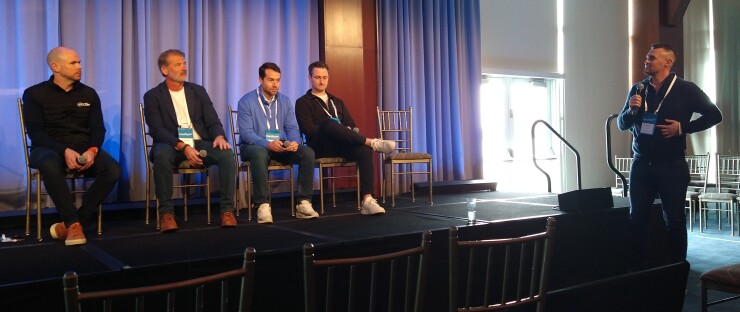Agentic AI may have sparked
They are concerned about carriers and insurtechs' use of AI taking away some of their business. Advanced user interfaces are not as valuable to them as simply selling coverage, according to agency and service provider executives.

"AI, once it learns how to do something, does it relentlessly and exceptionally well," said Garrett Droege, senior vice president and director of innovation and digital risk at IMA Financial Group.
"We're trying to optimize our humans with AI. The key is retention. I do see carriers taking some business away, or insurtechs taking business away from agents and brokers. People want to deal with people, and they want to deal with people that have the right tools to help them."

Advanced customer portals and capabilities, like agentic AI, just aren't as important to agents, according to Max Kane, CEO of Novella, an E&S insurance wholesaler. "An agent doesn't particularly care if we built a portal, if we haven't built a portal, if our UI is lovely, if it's not lovely," he said. "What they care about is finding our customer the easiest way possible."
Even for segments of the insurance market that are enthusiastic about using agentic AI, internal checks and balances, and safety protocols for consumer data and decision making are necessary, according to Jason Wrather, assistant vice president and innovation officer at Grange Insurance. The insurer has a

"Agentic AI is going to get you further downstream in terms of end to end solutions of processes within our industry. But we're going to also have to, as an industry, be very careful that we don't just set it and forget it," Wrather said. "You have to figure out the pros and cons, put some safety protocols in place, but continue to look for ways to apply it and apply the appropriate way."

Agents' importance to the insurance value chain – and their preferences – should not be discounted, according to Josh Curry, executive vice president at BMS Group, an insurance and reinsurance solutions company. "They own the customer. They own the economics. They are the one that makes the market," he said. "Gallagher, Aon, Marsh, WTW want access to more customers. They're not buying technology at these firms. They're buying access to customers. Unless you're GEICO or Progressive, most carriers will remain focused and diligent around creating value for the agents that serve them. If they want a better understanding of the customer and a more cost effective way to go to market, the agent is the way to do it."

Linqura, an AI co-pilot for commercial insurance, started with an open chatbot, but found that required users to be "prompt engineers," said Ryan Hanley, chief growth officer at the company. "One of our initial pieces of feedback that we got was that it wasn't constrained enough," he said. "In our mind, you could ask it anything you wanted, and it was too much freedom. As we put constraints, usage has gone up and customer feedback has gone up. It's marrying this almost analog interface with really leveraging the tech that's available."






